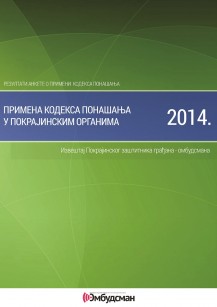 In spite of the fact that the least complaints in the institutional Annual Report of the Provincial Protector of Citizens - Ombudsman (PPCO) and that two thirds of the provincial, aka Vojvodina administration employees claim that they are familiar with the provisions of the Provincial Authorities' Code of Professional Conduct, the results of the PPCO survey on its implementation and observance indicate, amongst others, that there is still space for simplifying proceedings and more efficiency. Therefore, the PPCO has sent a report about its findings, along with official recommendations for improvement, to all provincial authorities, organizations and services.
In spite of the fact that the least complaints in the institutional Annual Report of the Provincial Protector of Citizens - Ombudsman (PPCO) and that two thirds of the provincial, aka Vojvodina administration employees claim that they are familiar with the provisions of the Provincial Authorities' Code of Professional Conduct, the results of the PPCO survey on its implementation and observance indicate, amongst others, that there is still space for simplifying proceedings and more efficiency. Therefore, the PPCO has sent a report about its findings, along with official recommendations for improvement, to all provincial authorities, organizations and services.
The response from 130 employees and officials from 32 various provincial administration units indicates that the overall grade of the work of the provincial administration is a B. Three quarters of survey respondents claim that they are familiar with the Code, while a quarter of them claim they are partially familiar with it. On a scale from one to five, (with five being the highest grade), a four, aka B has been given even to some of the key aspects of the provincial authorities' work as specified in the Code. Half of the respondents give the same grade to observance of the provisions of the Code by these authorities, the quality of performance of their colleagues in them, as well as to the purposefulness and effectiveness of these authorities' proceedings.
Read more: Grade 'B' for Vojvodina Authorities' Professional Performance
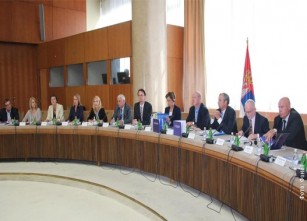 'I believe that the study presented today is a useful reading for us in the AP Vojvodina as well, because we in the Province face similar problems. Young people in Vojvodina are leaving Serbia because they do not know this language and opt for continuing their studies abroad,' said Аnikо Мuškinjа Hајnrih, the Provincial Ombudswoman, during the presentation of the Study on the Improvement Options for Learning Serbian as Non-Mother Tongue in the Primary Schools of Municipalities Prеšеvо, Buјаnоvаc and Меdvеdjа.
'I believe that the study presented today is a useful reading for us in the AP Vojvodina as well, because we in the Province face similar problems. Young people in Vojvodina are leaving Serbia because they do not know this language and opt for continuing their studies abroad,' said Аnikо Мuškinjа Hајnrih, the Provincial Ombudswoman, during the presentation of the Study on the Improvement Options for Learning Serbian as Non-Mother Tongue in the Primary Schools of Municipalities Prеšеvо, Buјаnоvаc and Меdvеdjа.
The research study is a result of collaboration between the Ministry of Education, Science and Technological Development, the three aforementioned local self-governments, the Albanian National Minority Council, the Education and Teaching Improvement Institute and the Education Quality Evaluation Institute, in this case all managed by the Coordination Body of the Government of the Republic of Serbia for the Municipalities of Prеšеvо, Buјаnоvаc and Меdvеdjа. The research included all primary school with teaching in Albanian language in these three municipalities (i.e. pupils and their parents, teachers, headmasters), local decision-makers and representatives of civil society, national and local authorities and businesses.
Read more: Common Problem: Poor Serbian Language Skills
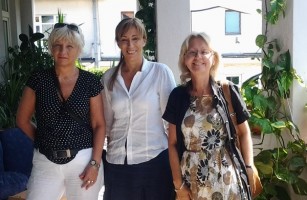 Аnikо Мuškinjа Heinrich, the Provincial Ombudswoman, the Children's Rights Deputy Ombudswoman Маriјa Kоrdić and Žеlјka Bundаlо, her Expert Associate, were in Sombor yesterday, where they talked to the citizens and filed their complaints personally.
Аnikо Мuškinjа Heinrich, the Provincial Ombudswoman, the Children's Rights Deputy Ombudswoman Маriјa Kоrdić and Žеlјka Bundаlо, her Expert Associate, were in Sombor yesterday, where they talked to the citizens and filed their complaints personally.
Twenty citizens addressed them; five of them got legal advice, while the rest of them filed complaints with the Provincial Protector of Citizens - ombudsman (PPCO) institution upon which official proceedings will be initiated. The complaints relate to the work of the inspection authorities of the Town of Sombor, the town's tax administration, the welfare center and the local branch of the National Pension and Disability Fund, mostly due to the length of their proceedings, losing the right to a pension on disability grounds and problems over acknowledgement of years of service with special benefits regime. Several complaints relate to labor and employment issues, such as non-payment of the jubilee award to employees, not letting employees exercise their right to an annual leave, etc.
Read more: Much Ado for the Ombudsman in Sombor
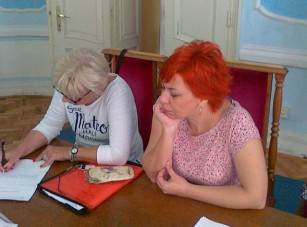 Аnikо Мuškinjа Heinrich, the Provincial Ombudswoman, and Еvа Vukаšinоvić, the Deputy Ombudswoman in charge of national minority rights protection, were in Ruma yesterday. They talked to the citizens in the local self-government building and visited the welfare center later on.
Аnikо Мuškinjа Heinrich, the Provincial Ombudswoman, and Еvа Vukаšinоvić, the Deputy Ombudswoman in charge of national minority rights protection, were in Ruma yesterday. They talked to the citizens in the local self-government building and visited the welfare center later on.
The number of complaints filed on the spot confirms that the citizens take the Provincial Protector of Citizens - Ombudsman (PPCO) institution seriously. The complaints related to issues concerning the exercise of the right to a disability-based pension, subsidized provision of medicines and medicinal spa treatment, communal and central heating system problems, non-transparent funding of sports activities by the local self-government, as well as the behavior of one of the members of a municipal sub-unit council.
Read more: Citizens of Ruma Are Taking the Ombudsman Seriously
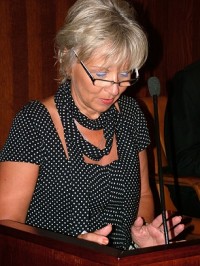
Mr. Varga-Haszonits was primarily interested in the position of the Protector of Citizens – Ombudsman institution concerning the position of the media reporting in minority languages and the possibility of quality exercise of the right to information in these languages. Another topic was also the future involvement of the institution in drafting the EU Accession Chapter 23 Action Plan – Judiciary and Basic Rights.
Concerning the media laws, Aniko Muskinja Heinrich expressed her fear that the survival of the media reporting in minority languages will remain a question mark even once these laws are in force. Their funding will be project-based and market oriented and it is a common knowledge that state, provincial and local self-government funding has been very limited for years back. During the contracting process, it is crucial to pay attention to the new private owners obligation to provide for continuity of media contents production since the new law provides no sanctions whatsoever in case the future owner fails to do it.
Read more: Provide Continuity for Media Reporting in Minority Languages
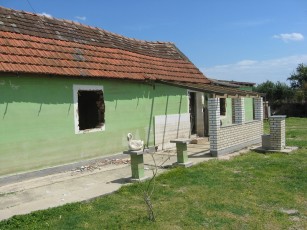
The village officials estimate the damage exceeds four million euro. The water flooded 147 family houses and 50 other buildings. Six houses were completely and another six partially destroyed. No fields remained unaffected by the floods, so they will have grave existential consequences for the villagers, all of them working in agriculture. They have insurance over their fields against hail, but not against floods, so they will have no income over the next year. After nearly a month in force, the state of emergency ended mid-June, but quite a number of them are still living outdoors and in tents. There is no reliable or credible information on when the reconstruction of the houses will start. There have been some charity shipments to the village, but currently there is a grave lack of livestock fodder.
Read more: Floods in Vojvodina: Water Gone – Problems Stayed





